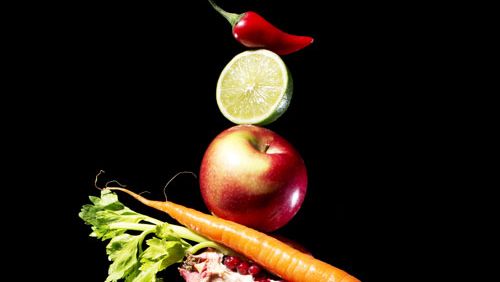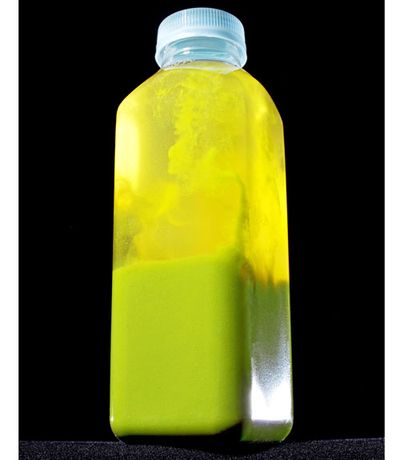Cleansing's Dirty Secret
Touted for myriad health benefits, chic juice diets are all the rage, but in their quest to detox and lose weight, some women — call them juicerexics — are hitting the bottle to dangerous degrees.

WHEN 22-YEAR-OLD Katie Bourus was a sophomore at the University of Oregon in 2010, she heard about the Master Cleanse from friends. At 5'7" and 130 pounds, Bourus wasn't trying to lose weight, just flush out her system fast, and the multiday liquid regimen, consisting of a mix of water, cayenne pepper, lemon juice, and maple syrup, seemed like an easy way to go. But Bourus soon found that she liked the empty feeling in her stomach, and three days on the cleanse stretched to five. Once she finished the fast, her previously balanced diet grewirregular. She refused fatty foods, claiming to be a vegetarian to avoid a lasagna dinner at her sorority house. Within a few months, Bourus was subsisting on Chex cereal with skim milk, her weight dwindling to 97 pounds. Alarmed, her parents checked her into an eating disorder treatment center in San Diego, where she was diagnosed with anorexia nervosa. "A cleanse sounded healthy," she says. "But I couldn't stop."
Today, the fresh juice business, including juice fasts, is worth $5 billion and growing, and indie cleanses like the one Bourus tried are being crowded out by scores of bigger players targeting young women with three- to 10-day programs of blended fruit and vegetable drinks and little to no solid food. The companies hire respected nutritionists and "integrative" doctors to hawk cleanses' supposed benefits—clearer skin, sounder sleep, more energy, instant weight loss—and celebrities from Gwyneth Paltrow to Blake Lively have signed on. In stylish offices on both coasts, carrying a bright green bottle of pulverized spinach, celery, and kale now confers automatic insider status. Even Starbucks has expanded into juices. But despite being a great source of vitamins and minerals, the plans—which claim to flush the body of toxins, curing everything from headaches, nausea, and fatigue to cold sores, insomnia, and yeast infections—are controversial. And as interest in them peaks, public health professionals and doctors are dealing with the fallout: an epidemic of malnourished, run-down young women—juicerexics—some of whom have stumbled into full-fledged anorexia or bulimia.
Statistics don't exist on the precise link between eating disorders and juice fasts, but Debbie Westerling, director of nutrition services at the Renfrew Center, one of the nation's best-known eating disorder treatment facilities, says that among the program's 60 residents, discussion of juice fasts has "exploded." During intake questioning, at least half of patients now report experimenting with juice fasts. "Maybe a patient tried it and became obsessed, or maybe the eating disorder was already there and the juicing became part of it," says Westerling. Other experts agree. Dr. Pauline Powers, who leads the scientific advisory committee for the Global Foundation for Eating Disorders, calls juice cleanses "the perfect pathway to disordered eating," with an alarming power to seduce otherwise healthy women. Last year, the University of North Carolina Center for Excellence for Eating Disorders added juice fasts to the list of topics addressed with patients.
Marjorie Nolan Cohn, a registered dietitian and nutrition director for Metro Behavioral Health Associates, an eating disorder treatment center in New York, points to the country's current food climate as conducive to cleansing. High-profile books and documentaries—likeFast Food Nation, Food, Inc., and Michael Pollan's entire oeuvre—have heightened consumer skepticism of processed food, chemicals, and pesticides. That's great, but it makes "the idea that you're releasing toxins an easy buy-in," says Cohn. "If you have a type A personality, a cleanse brings on a euphoric, overwhelming sense of control."
On top of that, juice cleanses are marketed ingeniously as quick fixes designed to erase the damage from weekend-long calorie benders. "Don't ever stress about those little bacon cheeseburger attacks," reads the website of Nékter Juice Bar, a California company that ships nationally. Nékter doesn't deliver on weekends, instructing clients via its website to spend the time "eating comforting foods with friends and family before you begin your fresh start." Companies have a vested interest in clients losing control occasionally. "We have customers who 'retox' and detox and that's their lifestyle: full tilt in one direction, then full tilt in the other," says Matt Shook, co-owner of JuiceLand in Texas. Ka-ching.
The key is to drink responsibly. Trisha O'Connor, 25, a public relations associate in New York City, heard about cleansing from fashion industry colleagues who often ate out with clients. "Everyone had the same mantra: 'Look at these truffle fries—this is so bad for me,'" says O'Connor, who cleanses seasonally. "You'd know what you were doing was bad, but a juice cleanse made you feel better." But detoxes attract more extreme devotees, too. Taylor Becker, who runs a New York City nonprofit, has done three mini-meal and juice cleanses from local operation Joulebody over the past four months and calls cleansing "addictive." "You get a high—the juices are powerful. My eyes are bright, my stomach is flatter, my pants are loose," says Becker, 43. Although she worries that the cleanses could trigger a binge-and-purge cycle—she's dealt with bulimic tendencies since adolescence—she believes she's not alone. "My secret theory is that most women of a certain income in urban environments like New York have eating disorders. Juicing is expensive, healthy, in the same category as SoulCycle"—a premium service for wealthy, weight-conscious women. "It's in vogue."

THERE'S NOTHING WRONG with juice cleanses, of course. But when coming off the plans, some women cut out entire groups of foods and develop aversions: no bread, no meat. Juice companies sell the idea that certain meals are bad; some even condemn healthy snacks like sugary fruits. And clients are buying in, nudged along by online sales and incentives. Chicago-based company JuiceRx brags online that many customers cleanse twice a month. Catalyst, which ships to customers across the U.S., calls clients who commit to 30, 45, or 60 days' worth of juice Rockstars and gives them discounts. But for women who are genetically predisposed to eating disorders, Johanna Kandel, founder of the Florida-based Alliance for Eating Disorders Awareness, says cleanses can be dangerous. One girl she worked with, who had a family history of eating issues, left for college healthy. She tried a juice cleanse and wound up in treatment. "It wasn't the cause, but it was the drop that made the cup overflow," says Kandel, who is peppered with cleanse questions—how often to do one, or how to tell if a roommate does too many—from college women. "Cleanses bring food and ritualistic behavior into focus."
Stay In The Know
Get exclusive access to fashion and beauty trends, hot-off-the-press celebrity news, and more.
Tim Martin, founder and CEO of Los Angeles–based iZO Cleanse, concedes that "cleanses can turn into an eating disorder if they're used as an excuse to binge afterward," behavior he dubs "macrobulimia." IZO Cleanse asks clients to confirm that they don't have eating disorders and to commit to a balanced post-cleanse diet; Yvette Rose, founder of Joulebody, gives customers post-cleanse dietary guidelines. Asked for comment, a few of the companies mentioned in this story acknowledged that juicing could exacerbate unhealthy eating habits. "We try very hard to discourage misuse of the cleanse," says Alexis Schulze, cofounder of Nékter Juice Bar. Others, like JuiceLand's Shook, were less attuned to the potential issues. "We make no claims to diagnose or treat psychological disorders," he says.
Of most concern? For women already in the throes of anorexia or bulimia, juice fasts provide a great cover. Kari Adams, 42, a blogger in Princeton, New Jersey, had been bingeing and purging for years when she tried a juice fast more than two years ago. Her yoga instructor was offering one to clients, and Adams knew "it would make me thinner," she says. After three weeks of juicing, she was sicker and frailer than ever. Her family intervened and checked her into a treatment center for five months. "I was like an addict who'd found a new drug," says Adams, who got positive reactions from friends during her juice fast. "People said, 'Oh, good for you. That's so healthy.' It's society's most accepted form of eating disorder."
-
 'Bad Influence' Charts the Demise of a Popular Social Media Squad—Here's Where the Kidfluencers Are Now
'Bad Influence' Charts the Demise of a Popular Social Media Squad—Here's Where the Kidfluencers Are NowThe names in the Netflix docuseries have fallen out of touch with subject Piper Rockelle.
By Quinci LeGardye Published
-
 What's Your Olfactory Personality?
What's Your Olfactory Personality?Curating your scent style infuses individualism into a perfume wardrobe.
By Samantha Holender Published
-
 The Future Queen of Norway Trades Camo Fatigues For a 125-Year-Old Tiara and Her Mom's Old Evening Gown
The Future Queen of Norway Trades Camo Fatigues For a 125-Year-Old Tiara and Her Mom's Old Evening GownSomething old, something new, something borrowed, something blue.
By Kristin Contino Published
-
 There's a Huge Gap in Women's Healthcare Research—Perelel Wants to Change That
There's a Huge Gap in Women's Healthcare Research—Perelel Wants to Change ThatThe vitamin company has pledged $10 million to help close the research gap, and they joined us at Power Play to talk about it.
By Nayiri Mampourian Published
-
 BetterMe Will Make Your New Year’s Resolutions Last the Other 12 Months
BetterMe Will Make Your New Year’s Resolutions Last the Other 12 MonthsSponsored BetterMe: Health Coaching uses a psychology-based program to approach your health goals from all angles, so they stay within reach.
By Sponsored Published
-
 Everlywell's At-Home Test Kits Are 40% Off
Everlywell's At-Home Test Kits Are 40% OffThe testing company is offering big savings on some of their most popular kits.
By The Editors Published
-
 Senator Klobuchar: "Early Detection Saves Lives. It Saved Mine"
Senator Klobuchar: "Early Detection Saves Lives. It Saved Mine"Senator and breast cancer survivor Amy Klobuchar is encouraging women not to put off preventative care any longer.
By Senator Amy Klobuchar Published
-
 I'm an Egg Donor. Why Was It So Difficult for Me to Tell People That?
I'm an Egg Donor. Why Was It So Difficult for Me to Tell People That?Much like abortion, surrogacy, and IVF, becoming an egg donor was a reproductive choice that felt unfit for society’s standards of womanhood.
By Lauryn Chamberlain Published
-
 The 20 Best Probiotics to Keep Your Gut in Check
The 20 Best Probiotics to Keep Your Gut in CheckGut health = wealth.
By Julia Marzovilla Published
-
 Simone Biles Is Out of the Team Final at the Tokyo Olympics
Simone Biles Is Out of the Team Final at the Tokyo OlympicsShe withdrew from the event due to a medical issue, according to USA Gymnastics.
By Rachel Epstein Published
-
 The Truth About Thigh Gaps
The Truth About Thigh GapsWe're going to need you to stop right there.
By Kenny Thapoung Published